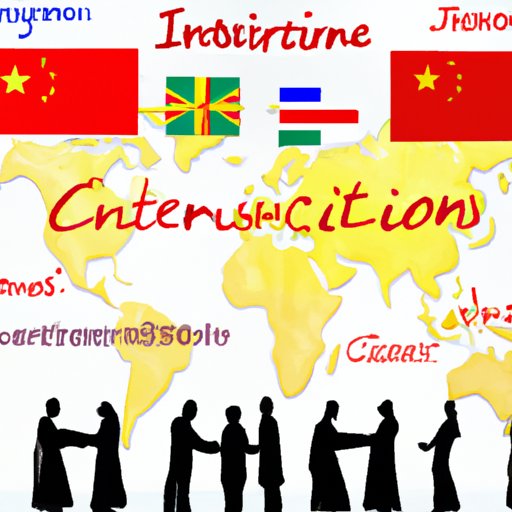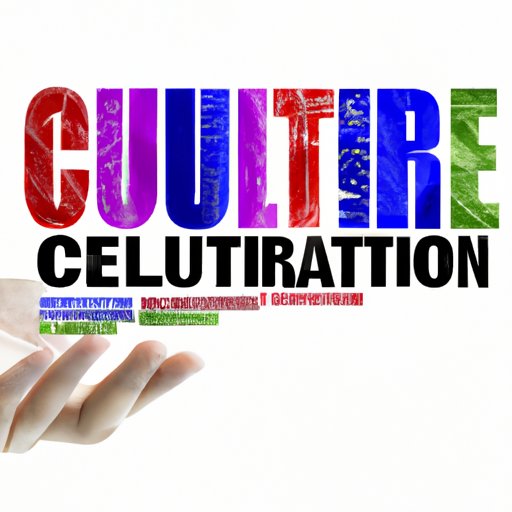Introduction
Culture is a complex concept that encompasses many aspects of our daily lives. From language and art to food and fashion, culture influences how we interact with each other and navigate the world around us. In this article, we will explore why culture is important, looking at how it shapes our identities, drives economic growth and development, encourages international collaboration, and fosters understanding between communities.

Role of Culture in Creating a Sense of Identity and Belonging
Culture plays an important role in helping us to form our identities and find a sense of belonging. As anthropologist Edward B. Tylor famously said, “Culture or civilization, taken in its broad, ethnographic sense, is that complex whole which includes knowledge, belief, art, morals, law, custom, and any other capabilities and habits acquired by man as a member of society.”
Our culture shapes the way we think, act, and view the world. It influences our values, beliefs, and behaviors, giving us a sense of identity and belonging. For example, if you are part of a particular ethnic group, you may have certain customs and traditions unique to your culture that help to define who you are and provide a sense of connection to your community. This can be incredibly empowering and give us a strong sense of purpose and direction.
Having a sense of belonging also has numerous benefits. According to research conducted by the American Psychological Association, feeling connected to a group can reduce stress, improve self-esteem and confidence, and boost mental wellbeing. It can also encourage us to take risks, build relationships, and become more engaged in our communities.

Impact of Cultural Diversity on Economic Growth and Development
Cultural diversity can also have a positive impact on economic growth and development. Research from the World Bank has found that countries with higher levels of cultural diversity tend to have stronger economies, with greater innovation and better access to global markets. Countries with diverse cultures are able to attract the best talent and resources from around the world, allowing them to create new products and services and develop their economies.
However, managing cultural diversity can present challenges. Different cultures can have different values, beliefs, and expectations, which can lead to misunderstandings and conflict. Organizations need to ensure they have effective policies and procedures in place to promote inclusion and acceptance, while also respecting different cultures. This can help to foster a positive working environment and maximize the potential of a diverse workforce.

Importance of Cultural Exchange and Collaboration for International Relations
Cultural exchange and collaboration between different countries and cultures is also essential for international relations. By engaging in dialogue and sharing experiences, people from different backgrounds can gain a deeper understanding of each other’s perspectives and cultures, breaking down barriers and fostering mutual respect and understanding.
This kind of collaboration can also lead to innovative solutions to global problems. For example, the United Nations Sustainable Development Goals bring together governments, civil society, and businesses from around the world to work together to address issues such as poverty, inequality, and climate change. By leveraging the expertise and experience of different cultures, these collaborative efforts can achieve much more than any one country or organization could do alone.
Different Cultures Contribute to Creativity and Innovation
Creativity and innovation often thrive when different cultures come together. By embracing diverse perspectives, ideas, and ways of thinking, organizations can unlock new opportunities and discover innovative solutions to problems. For example, the Japanese practice of kaizen – or continuous improvement – combines the traditional Japanese emphasis on teamwork and efficiency with Western notions of quality control and customer service to create an effective system for business improvement.
In today’s increasingly interconnected world, it is essential for organizations to embrace diverse cultural perspectives. Research from the Harvard Business Review has found that teams with members from different backgrounds and cultures are more likely to generate creative ideas, challenge assumptions, and identify novel solutions to complex problems.
Cultural Practices Foster Understanding and Respect Between Communities
Cultural practices can also foster understanding and respect between different communities. Participating in activities such as music, dance, art, and storytelling can help people to appreciate each other’s cultures, build empathy, and strengthen bonds. For example, the annual Festival of India in Houston, Texas, brings together people from different backgrounds to celebrate Indian culture through music, art, and dance.
These kinds of events can also help to bridge divides between communities. By coming together to celebrate different cultures, we can learn from each other and develop greater understanding and respect for one another. This can help to build stronger, more vibrant communities and create a more harmonious society.
Conclusion
In conclusion, culture is an integral part of our lives. It shapes our identities, drives economic growth and development, encourages collaboration between different cultures, and helps to foster understanding and respect between communities. We must continue to celebrate and embrace the diversity of cultures around the world and recognize the vital role they play in creating a better future for all.
By embracing cultural exchange and diversity, we can create a more just, equitable, and inclusive society where everyone is respected and valued. Only then can we truly reach our potential and achieve true progress and prosperity.
(Note: Is this article not meeting your expectations? Do you have knowledge or insights to share? Unlock new opportunities and expand your reach by joining our authors team. Click Registration to join us and share your expertise with our readers.)
